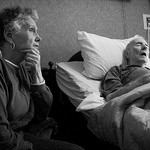Does your relationship have what it takes to deal with a medical illness?
Relationships can be tricky; they require communication, honesty, and love to keep it alive and healthy. You recognize what each other need and want out of the relationship and out of each other. You begin to share life lessons with one another. You learn to provide emotional support, validation, and compliments. You start sharing goals and dreams that resonate with both of you. You discover the value of compassion, acceptance, and forgiveness. But, what happens when the relationship you’ve worked so hard to keep healthy is threatened by a medical illness and it’s consequences?
Earning his doctorate in Medical Family Therapy from East Carolina University, Dr. Dan Marlowe is the Director of Behavioral Health for Campbell University’s School of Osteopathic Medicine where he is in charge of the psychosocial health of the medical and graduate student body. Dr. Marlowe’s studies focused on the integration of mental and behavioral health in medical settings, as well as the treatment of families and couples dealing with acute and chronic illness. His doctoral residency was spend at Duke Cancer Institute’s Cancer Patient Support program where he helped launch their research program as well as helped to expand their collaborative care program the provides counseling services to patients and their families at no cost. Dr. Marlowe is the president-elect for the North Carolina Association for Marriage and Family Therapy.
To find out more about Dr. Marlowe and his practice, Campbell University School of Osteopathic Medicine, you can call (910) 893-1560 for an appointment.
Podcast: Play in new window | Download
Are your sleeping habits affecting your marriage?
We all know sleep is important for our health. But how many of us really take into consideration the effects that a lack of sleep can have on not only our physical health, but our mental and emotional health as well? The sleeping habits that we enlist (or don’t enlist) can actually have an affect on nearly every aspect of our lives, including relationships and marriage.
For couples dealing with sleepless nights, or nights consisting of less-than-sound sleep, life and managing a marriage can be a little more difficult. What many people don’t consider is that there are many different types of sleep disorders that can ultimately effect your well being and the well being of your spouse.
Today we’re talking with Brent Brandow, Director of Operations for the Parkway SleepHealth Center in Cary, NC. According to him, sleep—or a lack thereof—has more of an impact on our daily lives and relationships than people might think. With a little diligence though, every problem can be fixed.
The Parkway SleepHealth Center is a comprehensive sleep health center that provides sleep physician consultations, diagnostic testing and treatment services for more than 80 sleep disorders, including sleep apnea, narcolepsy, and insomnia.
To find out more about the Parkway SleepHealth Center, visit their website or call (919) 462-8081 to schedule an appointment.
Podcast: Play in new window | Download
Lack of attention does not have to mean lack of a relationship.
Is an undiagnosed case of ADHD to blame for your spouse’s lack of attention to your relationship? The acronym ADHD summons several images to mind. We’re more likely to think of overactive children unable to concentrate in school, not our full-grown, adult partner. The truth is that ADHD is a condition that does not discriminate based on age, the effects of ADHD are just as likely to manifest in adults. However, many adults are not even aware that their behavior could be linked to a medical diagnosis. Have you ever felt like a parent to your spouse, always micromanaging and making sure they do what they promised. It is possible that your spouse has ADHD. Perhaps, on the flip side, you feel as though your partner is always nagging you and constantly repeating themselves. It is possible that you have an undiagnosed case of ADHD. In this two-part series of Stay Happily Married, we’ll uncover how to spot the signs of ADHD in your spouse, as well as how an undiagnosed and untreated case of ADHD can eat away and destroy a marriage.
Dr. Susan Orenstein received her Ph.D. in Counseling Psychology from Temple University. She is a licensed psychologist and Director of the group private practice, Orenstein Solutions, in Cary, NC. Susan specializes in adult relationship issues and has worked extensively in treating couples in situations where ADD and ADHD effect one partner. Susan has been happily married for 23 years and her husband and she co-facilitate the PAIRS couples workshop, where they continue to refresh their own communication skills in front of workshop participants. To find out more about Susan Orenstein and her practice, Orenstein Solutions, you can call 919-428-2766 for an appointment.
Click here to listen to part 2 of this special.
Podcast: Play in new window | Download






